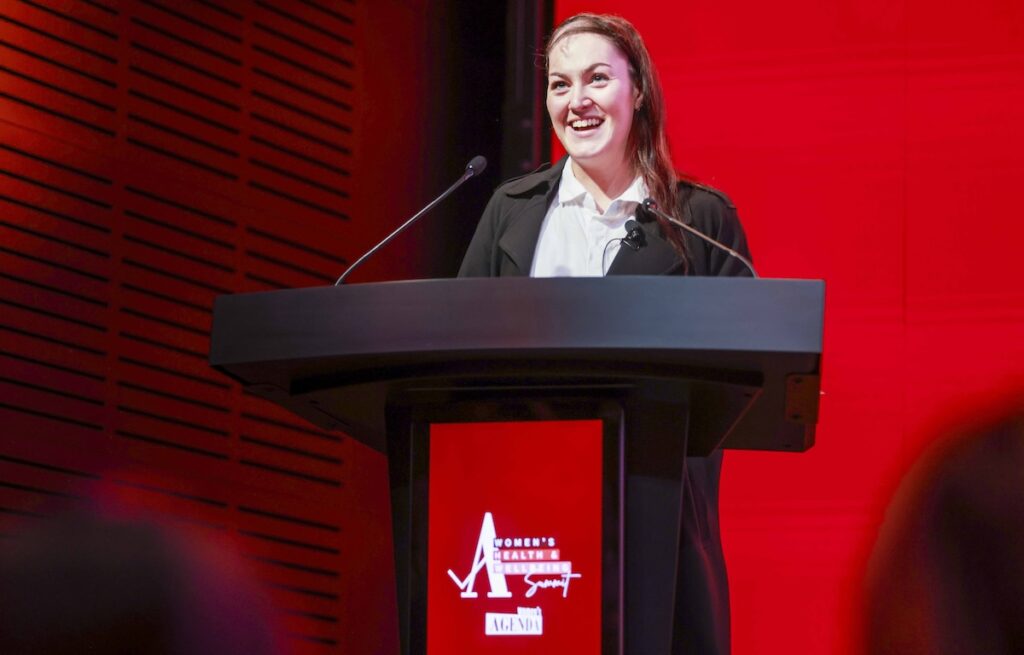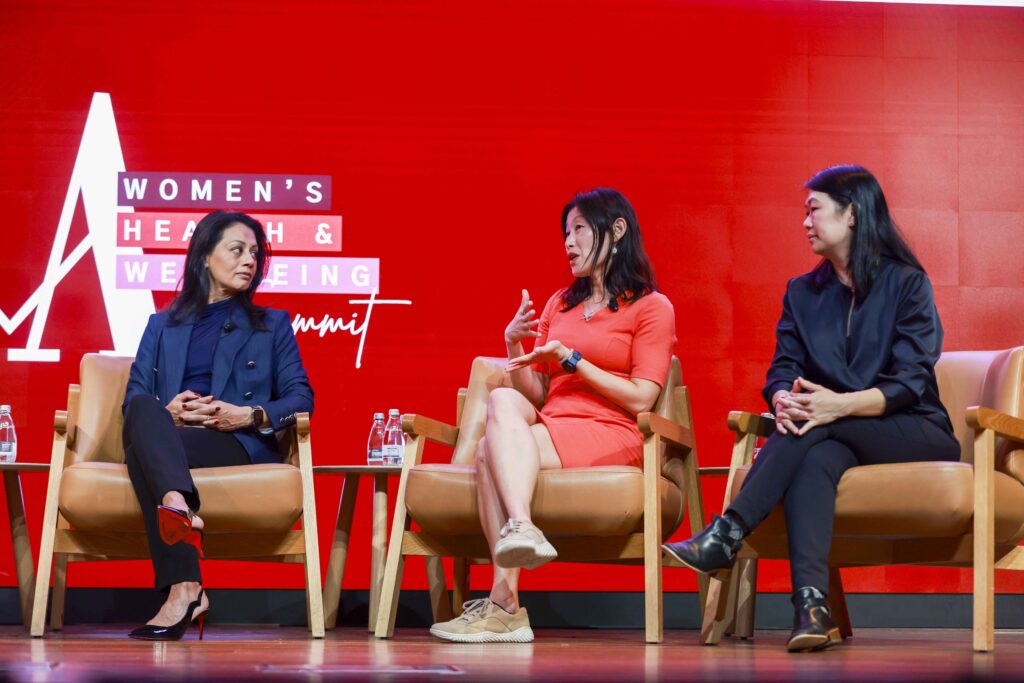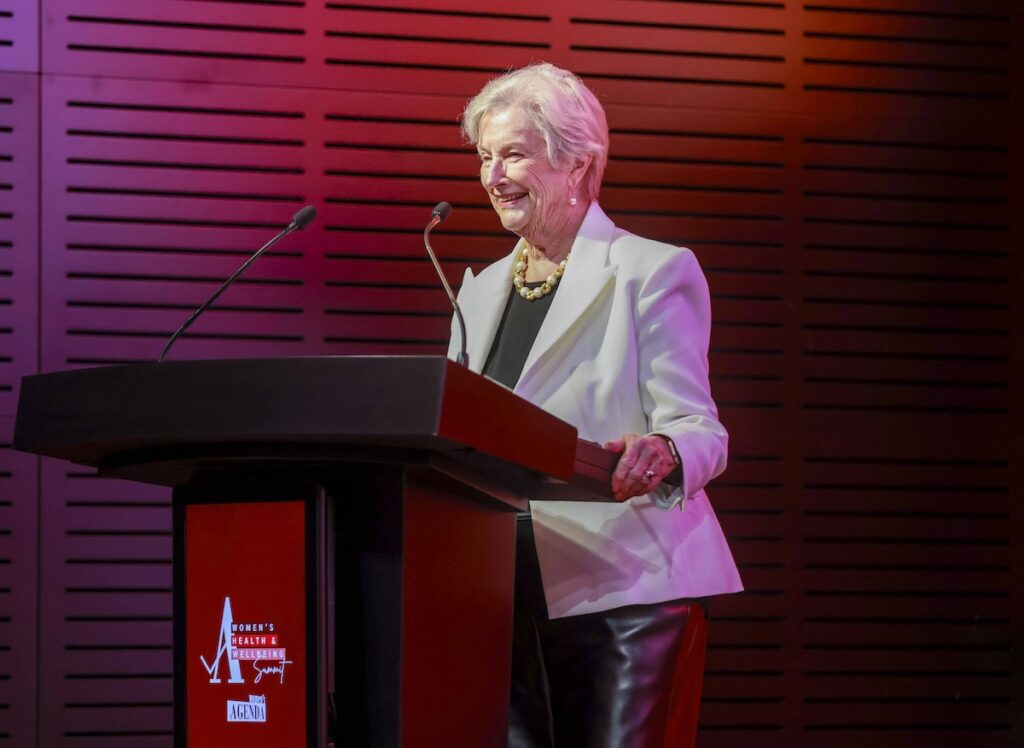From brain health to cardiovascular health, social connection is a vital determinant in positive health outcomes for women. It’s key to resilience and has underpinned the collective action that has achieved hard-won advancements in women’s health.
So how can we foster more social connections, especially as loneliness appears to be growing among certain groups? This was a theme that came up repeatedly during our Women’s Health and Wellbeing Summit on Tuesday.
Sophie Delezio spoke about the power of “chosen family” and nurturing a “team” to tap into resilience in dealing with personal challenges.
Having survived two separate, devastating accidents within her first few years of life, including being badly injured when a car crashed into her day care centre at the age of two, she speaks from experience.
Sophie lost both feet, one hand and an ear following the first accident, and suffered further injuries in the second accident. She defied medical expectations and learned to walk, sit and swim again.
Now a prominent content creator across social media and a mother of a one-year-old, Sophie shared an opening keynote at our Women’s Health & Wellbeing Summit that ultimately set the tone for the entire day.
She spoke about how her parents tapped into the support of friends and the community following her accidents, noting how, with most of their family overseas, they leveraged the “chosen family” available locally.
It’s a lesson she took on growing up. One that underpinned her own resilience and drives the positivity she shares with her audience online and as a speaker.
While our Summit hosted conversations on women’s health ranging from cardiovascular health to perimenopause and menopause, brain health and addiction in women, the theme of tapping into connections and friends filtered through almost all of it.
We’re seeing increasing evidence of the significance of social connection to women’s health and longevity, including its support for both physical and mental health, as well as its role in preventing illness and disease. Women’s networks and connections have also proven vital in dispelling misinformation and disinformation about women’s health, and in providing support and options to victim-survivors of violence against women.
Later in the Summit, Wendy McCarthy AC (pictured above) also hinted at the power of social connection in driving significant campaigns that led to changes in reproductive rights and advancements in women’s health.

– Tuesday 2 September 2025. Photographs by Katherine Griffiths
While Wendy noted the importance of “putting yourself first and using your voice for better health”, she shared how the changes she’s been involved in campaigning required community support.
They required community connection, and finding others who’ve similar personal experiences that are ready to turn them into community and political debates. Wendy spoke about the first campaign she worked on involving a group that came together to change the rules in hospitals so fathers and partners could be present at the birth of their children.
From there, Wendy ventured into family planning, running various campaigns for reproductive rights.
“If we work together, our images of ourselves are on a firmer base. We can be better friends and better lovers, better people, more self-confident, more autonomous, stronger and more whole,” she said.
“You do things collectively, you’ve got a much better chance of understanding and changing the rules.”
Wendy spoke about staying connected to a group she has campaigned with for more than fifty years. They stay in touch and operate something akin to a book club to stay up-to-date on key issues. Importantly, they stay vigilant about health, especially on reproductive rights.
“Without vigilance, nothing is ever won,” Wendy said.
Vigilance is easier to maintain when connected to others.
Ending loneliness together
During various sessions throughout the day, we learned about the connection between social connection and cardiovascular health, as well as its role in reducing cognitive decline and protecting against dementia.
However, we also heard increasing concerns about loneliness among women, as well as the impact of AI and technology on our methods of staying connected.
The latest Medibank Loneliness Population Index found that more than half of Australians feel lonely in a typical week. Those who are typically deemed as “young and free” are the most at risk of loneliness, according to the research. Australians cite loneliness as a top mental health issue, alongside depression and anxiety.
We dedicated a panel to a discussion on ending loneliness in women, thanks to the support of Medibank.
The goal was to spark more discussions about loneliness in women, while highlighting opportunities for women to connect.
Speaking from the panel, the founding chair of Ending Loneliness Together, Dr Michelle Lim, said loneliness is much more than a mental health issue. It’s also a community and social issue, one that requires serious government consideration in developing a coordinated strategy to address the issue.
Professor Melody Ding from the University of Sydney said, “Prioritising connection is as important to your health as your diet and everything else we discuss on health.”

– Tuesday 2 September 2025. Photographs by Katherine Griffiths
Ali Walker, a specialist in human connection and culture, said that connecting with others is not about grand gestures, but rather it’s the small signals applied day-to-day. “Use people’s names,” she said. “Notice things they are saying and reference their comments, so they feel seen and noticed. Also, sharing the rituals you have, such as ‘I go for a walk every Friday, if you ever want to join’ can also be beneficial.
Ali also shared the power of matching tone and energy in conversations with others and being willing to repair relationships if things go wrong. She urged people to schedule time for various forms of connection throughout the week, including self-reflection and engagement with one’s surroundings, one-on-one interactions with others, social connections, and engagement with the world.
Dr Shona Sundaraj, Group Medical Director at Medibank, noted how loneliness is contributing to mental health and even cardiovascular disease and is being compared in longterm impact on health to smoking 15 cigarettes a day.
“We have to break down the stigmatisation that comes with loneliness, she said.
“Smile at that person you see in the street. You never know what their story is. It’s a micro action, but it can help.”
Clearly, there’s much to be gained from more discussions on loneliness in women and creating more spaces and opportunities for women to access new connections.
It’s an important aspect of mental health, preventative health and social health. It’s important for advocating for better outcomes on women’s health, especially in navigating the politics and backlash that come from pushing for change in difficult areas, such as those that Wendy McCarthy has achieved.
But connecting socially requires small daily habits, micro actions and even vulnerability.
As Sophie Delezio said, “Loneliness loses its power when we let others in.”
We will be sharing more from the Women’s Health and Wellbeing Summit in the coming days.
Thank you to our sponsors who made the event possible, including Medibank, Genea, Fare Australia, Organon, National Breast Cancer Foundation, Mums Matter Psychology and CSIRO Total Wellbeing Diet.


